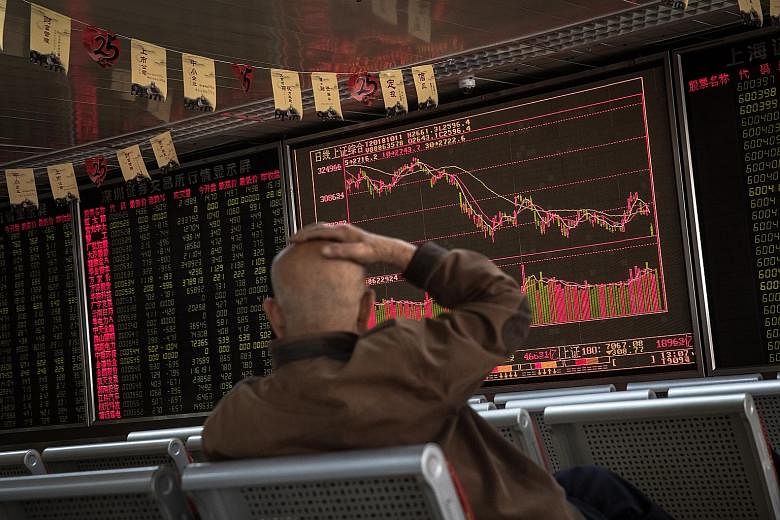The bloodbath in American markets spilled over to their Asian counterparts, with China and Taiwan plunging around 6 per cent on fears that global risks are mounting amid rising interest rates and trade tensions, while rising bond yields continued to suck money out of equities.
Fears of a major correction sent the most widely watched gauge of investor fear - the US CBOE Volatility Index, or the VIX - rocketing to a new six-month high of 24.1 points yesterday.
Japan, Hong Kong and South Korea shed about 4 per cent, while Shanghai and Shenzhen, already in bear-market territory, lost 5.22 per cent and 6.45 per cent, respectively. South-east Asia was not spared either, with the Straits Times Index (STI) finishing down 2.69 per cent. Malaysia sank 1.54 per cent yesterday, Thailand 2.26 per cent and Jakarta 2.02 per cent.
"Equity markets are locked in a sharp sell-off, with concerns over how far bond yields will rise, warnings from the International Monetary Fund about financial stability risks and continued trade tension all driving uncertainty," said Australia and New Zealand Banking Group.
The Dow on Wednesday posted its worst one-day drop of more than 830 points, or 3.2 per cent, since early February, while the Nasdaq notched its largest single-day sell-off since June 24, 2016.
Analysts say a recent sharp rise in yields on US Treasury bonds has triggered a shift in demand for safe haven assets. Stocks tend to lose their allure after sharp spikes in yields because they make bonds more appealing.
CMC Markets analyst Margaret Yang said the sell-off in Singapore is "more sentiment-driven than fundamentals-driven".
The Singapore market has already fallen by nearly 16 per cent from a one-year peak of 3,615.28 on May 2, "so further downside is cushioned by low valuations and high dividend yields", she added.
"Further correction will depend on whether the US tech stock rout continues. Fundamentally, the US economy is still strong, but investors are worried about the trade war and the US earnings season", which unofficially kicks off today, Ms Yang said.
So far, US companies have been performing up to expectations despite the trade war. Should that continue, markets will likely recover. "But if corporate America paints a gloomy picture due to trade disputes, higher import prices, a stronger dollar, this will confirm that stocks have topped out for 2018," she added.
Remisier Chung Chun He believes the correction in the US market is just beginning, and could carry over to Asia.
"Even though Singapore is already oversold, there is still room to test 3,000 levels," he said.
SEE BUSINESS


